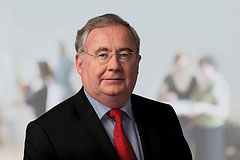A more integrated European energy market offers opportunities for an lucrative international market for Irish renewable energy, but will require State level infrastructural support, strong national energy producers and distributors and a vibrant SME energy innovation sector: all music to the ears of those involved in renewables production.
There was a warm welcome for remarks made by Minister Pat Rabbit as he addressed the Institute of International and European Affairs on Friday. In his speech (posted here on labour.ie) the Minister re-affirmed the principles of State involvement in the development of the country’s natural resources: ‘the wind… belongs therefore to the State and its exploitation as a natural resource must be on behalf of the people and driven by the public interest.’ He went on to suggest some of the ways the people could benefit from this exploitation: whether through direct involvement of state owned companies or through licensing or taxation methods.
Minister Rabbitte did suggest however that a passive involvement in the development of renewables was unlikely. Many of the opportunities of an integrated FUI (France, UK and Ireland) regional energy market presented challenges of scale: ‘investment in infrastructure is critical if we are to achieve the most ambitious of our energy objectives: completing the Internal Energy Market in both electricity and gas’ he claimed.
He also appeared to indicate that a network of privately owned, financed and installed inter-connectors was not the optimum solution, instead he spoke positively of the need for State involvement in such large scale projects as pumped hydro-storage (in essence the Spirit of Ireland proposal) industrial scale wind-farms (many offshore, but some onshore also) and national inter-connectors.
The Ministers’ statement did include good news for the smaller renewables producers and technology developers and he suggested that synergies between small scale renewables producers and ICT companies offered rich opportunities: ‘There are also significant Energy/ICT opportunities for new innovative companies at start up and SME level. ‘
Overall, the Minister’s message appeared to be that the renewables sector required the involvement of the State and strong national energy producers and distributors in order to provide the necessary infrastructure and he cautioned against the fragmentation of Ireland’s energy production market, asserting not only the right of the State to play a role in the exploitation of renewable natural resources, but also the commercial logic of such an involvement.

